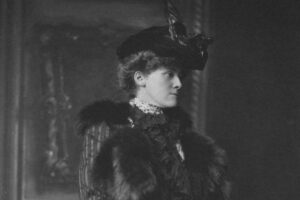
The historical process in which some voices speak loudly because their words are preserved and some voices disappear because so little of what they said and thought survives turned the tables. In that historical conversation, Lucretia’s view of her relationship with Edith has been silenced and we are left with Edith’s remembered version. In her 2007 biography, Hermione Lee calls the picture Edith Wharton painted of her mother “one of the most lethal acts of revenge ever taken by a writing daughter.”
When I first began writing non fiction I thought it would be a simple thing to research my way to the real truth, to what actually happened. I was fully prepared to invest the time necessary to get things right. As the historian Gordon S. Wood points out, there will always be a tension between what happened and how it’s remembered. It’s how various non fiction writers interpret the events and the memories and the silences that keep the historical narrative alive and vibrant.
—
The Brave Escape of Edith Wharton
By Connie Nordhielm Wooldridge
Edith Wharton, author of Ethan Frome, The House of Mirth, and other acclaimed novels, was born into a wealthy New York City family during the Gilded Age. In fact, she was a Jones of “keeping up with the Joneses” fame. This anecdote opens Woodridge’s biography of an astonishing life. Beginning in childhood, Edith found ways to escape from society’s and her family’s expectations and follow an unconventional, creative path. Unhappily married and eventually divorced, she surrounded herself with the cultural creatives of her day, mostly male friends. To escape the obligations of New York City high society, she spent much of her life in Paris and was recognized by the French government for her work establishing four charities during World War I. Her literary and personal life, her witty and incisive correspondence, her fondness for automobiles and small dogs–all are detailed in this vibrant account of a woman well ahead of her time. Includes photographs, a bibliography, source notes, and an index.
—
Connie Nordhielm Wooldridge, Author

- Just Fine They Way They Are (Calkins Creek, March 1, 2011)
- The Brave Escape of Edith Wharton (Clarion Books, 2010)
- Thank You Very Much, Captain Ericsson! (Holiday House, 2005; Berndtsdotter Books, 2012)
- When Esther Morris Headed West (Holiday House, 2001)
- The Legend of Strap Buckner (Holiday House, 2001)
- Wicked Jack (Holiday House, 1995)
Speaker / Presenter
Connie is an experienced speaker and presenter who enjoys sharing her passion for writing and her experience as a writer with readers and writers of all ages. She has presented to students, community, civic and professional organizations, writing groups, library audiences, and seniors – wherever book lovers gather!
>> More Information About Connie Speaking and Presenting


